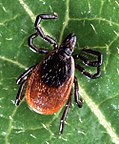Disease vector
Disease vector refers to any living organism that can carry and transmit an infectious pathogen into another living organism. Vectors are typically bloodsucking insects and ticks which play a crucial role in the transmission of diseases between humans or from animals to humans. Many of the world's major diseases, including Zika virus, Malaria, Dengue fever, and Lyme disease, are transmitted by these vectors. Understanding the biology and ecology of vectors is essential for the development of strategies to prevent disease transmission.
Types of Vectors[edit]
Vectors can be categorized into two main types: biological vectors and mechanical vectors.
Biological Vectors[edit]
Biological vectors, such as mosquitoes, ticks, and fleas, have a complex life cycle that allows the pathogen to multiply or develop within the organism before the pathogen is transmitted to a new host. For example, the Anopheles mosquito is a well-known vector for malaria, as it allows the malaria parasite to complete its lifecycle within the mosquito before it is passed on to humans.
Mechanical Vectors[edit]
Mechanical vectors, on the other hand, transmit pathogens from one host to another without the pathogen needing to complete its life cycle within the vector. Common examples include flies and cockroaches, which can carry pathogens on their bodies from feces or decaying matter to food or wounds.
Vector-borne Diseases[edit]
Vector-borne diseases are infections transmitted by the bite of infected arthropod species, such as mosquitoes, ticks, triatomine bugs, sandflies, and blackflies. According to the World Health Organization (WHO), vector-borne diseases account for more than 17% of all infectious diseases, causing more than 700,000 deaths annually.
Prevention and Control[edit]
Preventing vector-borne diseases involves protecting individuals from vector bites and reducing vector populations. Strategies include the use of insect repellent, wearing long-sleeved shirts and long pants, using bed nets, and eliminating standing water where mosquitoes breed. Community-wide efforts may also include insecticide spraying and the release of genetically modified or sterile male mosquitoes to reduce mosquito populations.
Research and Development[edit]
Ongoing research aims to better understand vector biology, ecology, and control. This includes the development of new tools and strategies for vector control, vaccines to prevent vector-borne diseases, and improved diagnostics. The Genetic modification of disease vectors is a promising area of research that could lead to significant reductions in vector populations or the ability of vectors to transmit pathogens.
Conclusion[edit]
Disease vectors play a significant role in the transmission of infectious diseases. Effective control and prevention of vector-borne diseases require a comprehensive understanding of vector biology, ecology, and the development of innovative control strategies. Public health efforts must continue to focus on reducing the risk of disease transmission through vector control, surveillance, and education.
-
Anopheles stephensi mosquito
-
Adult deer tick
-
Disease vector
-
Gilded vectors of disease
Ad. Transform your life with W8MD's Budget GLP-1 injections from $49.99


W8MD offers a medical weight loss program to lose weight in Philadelphia. Our physician-supervised medical weight loss provides:
- Weight loss injections in NYC (generic and brand names):
- Zepbound / Mounjaro, Wegovy / Ozempic, Saxenda
- Most insurances accepted or discounted self-pay rates. We will obtain insurance prior authorizations if needed.
- Generic GLP1 weight loss injections from $49.99 for the starting dose of Semaglutide and $65.00 for Tirzepatide.
- Also offer prescription weight loss medications including Phentermine, Qsymia, Diethylpropion, Contrave etc.
NYC weight loss doctor appointmentsNYC weight loss doctor appointments
Start your NYC weight loss journey today at our NYC medical weight loss and Philadelphia medical weight loss clinics.
- Call 718-946-5500 to lose weight in NYC or for medical weight loss in Philadelphia 215-676-2334.
- Tags:NYC medical weight loss, Philadelphia lose weight Zepbound NYC, Budget GLP1 weight loss injections, Wegovy Philadelphia, Wegovy NYC, Philadelphia medical weight loss, Brookly weight loss and Wegovy NYC
|
WikiMD's Wellness Encyclopedia |
| Let Food Be Thy Medicine Medicine Thy Food - Hippocrates |
Medical Disclaimer: WikiMD is not a substitute for professional medical advice. The information on WikiMD is provided as an information resource only, may be incorrect, outdated or misleading, and is not to be used or relied on for any diagnostic or treatment purposes. Please consult your health care provider before making any healthcare decisions or for guidance about a specific medical condition. WikiMD expressly disclaims responsibility, and shall have no liability, for any damages, loss, injury, or liability whatsoever suffered as a result of your reliance on the information contained in this site. By visiting this site you agree to the foregoing terms and conditions, which may from time to time be changed or supplemented by WikiMD. If you do not agree to the foregoing terms and conditions, you should not enter or use this site. See full disclaimer.
Credits:Most images are courtesy of Wikimedia commons, and templates, categories Wikipedia, licensed under CC BY SA or similar.
Translate this page: - East Asian
中文,
日本,
한국어,
South Asian
हिन्दी,
தமிழ்,
తెలుగు,
Urdu,
ಕನ್ನಡ,
Southeast Asian
Indonesian,
Vietnamese,
Thai,
မြန်မာဘာသာ,
বাংলা
European
español,
Deutsch,
français,
Greek,
português do Brasil,
polski,
română,
русский,
Nederlands,
norsk,
svenska,
suomi,
Italian
Middle Eastern & African
عربى,
Turkish,
Persian,
Hebrew,
Afrikaans,
isiZulu,
Kiswahili,
Other
Bulgarian,
Hungarian,
Czech,
Swedish,
മലയാളം,
मराठी,
ਪੰਜਾਬੀ,
ગુજરાતી,
Portuguese,
Ukrainian




